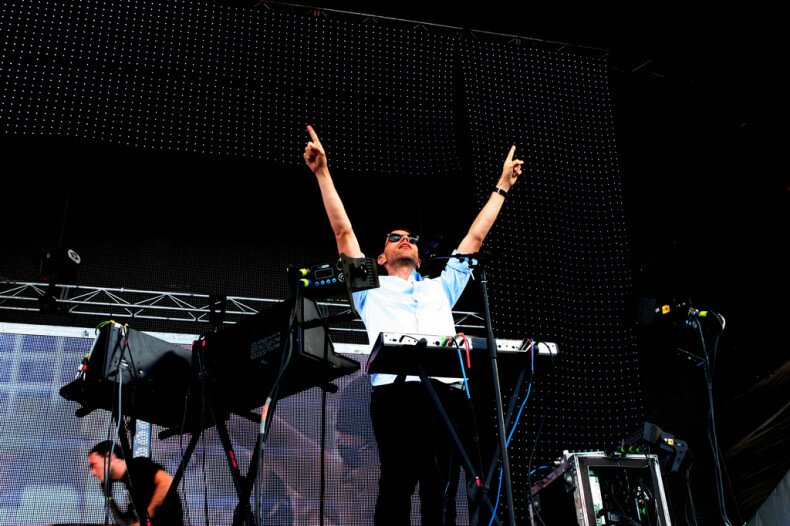Tommy Darker’s “Musicpreneur” Movement

When we first told you about Tommy Darker, he was taking Midem by storm with his “musicpreneur” concept.
Darker just released a new whitepaper on musician indecisiveness as a teaser for his new book on the same topic. His writing is the result of thousands of hours of research and conversations with working musicians on what’s working, and what isn’t. This is what led him to tackle musician indecisiveness, which he identified as one of the biggest obstacles to music career success.
While eagerly awaiting the book, we reached out to Darker to learn more about the “musicpreneur” movement he’s spearheading, and what advice he has for musicians to succeed in the transformed landscape of the music business.

Tommy Darker
Could you please introduce yourself to our readers, and tell us a bit about how you personally ended up as a trailblazing music industry thinker?
Hello, I’m Tommy Darker. I’m a London-based Musicpreneur who likes thinking of himself as a music industry thinker. Why am I describing myself with a word that is open for interpretations? Because it reflects how the music industry looks like and its needs. We don’t need more self-proclaimed gurus (although it’s a ‘hot’ word). We need more experimenters and explorers, since no-one in the music business really knows what’s happening next.
Plus, my writings represent my thoughts, not an ultimate reality. An expert needs to be always right, a thinker can always get away with it.
You’re perhaps best known for popularizing the term “musicpreneur”. How do you define a musicpreneur, and why do you think the trend is spreading so quickly?
A Musicpreneur (with capital M, just to point out its gravity) is an independent, polymath musician who takes care of both their artistic and entrepreneurial aspect of their music career, creating business models and revenue streams.
This definition highlights the fluidity of today’s music world: the procedure of business model generation involves plenty of experimentation, trial and error. We’re moving from a single, fixed business model to a portfolio of business models. Revenue streams reflect this mindset as well – a sole source of income is equal to business failure. Artists need to diverse their revenue streams and give gravity to the ones that work better for them.
Do you see a trend? I’m not so sure. I won’t be convinced utill I see most musicians comfortably behaving as Musicpreneurs. Trends die. There is indeed a need for music entrepreneurship, but ideas that don’t become mainstream, eventually die. Let’s see.
You talk to lots of musicians about what’s working and what’s not working for their music businesses. What are the most lucrative, growing revenue streams, and what revenue streams do you recommend de-emphasizing?
Great question. But it’s a tricky one. I cannot be sure that these revenue streams will remain profitable in the near future. Things change so fast, that the question itself might become obsolete pretty soon.
At the moment, as I mentioned in my Midem 2014 report, there’s a lot of money in licensing, ghostwriting, hardware, platforms and artist-brand collaborations. At least, that’s what I see, I might be wrong. These revenues, however, are not relevant for each artist and can only become practical and attainable if they click into the artist’s business model.
In general, there’s no such thing as ‘good’ or ‘bad’ revenue streams. It’s how you use them and how profitable you make them for yourself. Some people make money vlogging on YouTube. It doesn’t mean you have to do the same.
One thing I appreciate about your approach is that it embodies the “polymath” aspect of the musicpreneur role, touching on everything from business and marketing strategy to design, production value, and psychology. I agree that understanding music from an entrepreneurial perspective is the key to a long, sustainable life of music making.
However, some musicians argue that assuming this business/marketing role detracts from their ability to focus on their music and being creative. What do you say to the criticism that musicians who focus on business necessarily compromise their artistic integrity?
Great question as well (and a hot debate among artists). I’m a musician myself. I see art and commerce as two inextricably connected elements. Long conversation, but I’ll try to sum up my main point in the following story.
A couple of years ago I went to Nepal with a friend. We stayed with locals and involved ourselves in their daily activities. While taking a rest, I asked a 25-year-old family guy, sitting next to his 7-year-old daughter:
“Would you like to move to Europe and work there? You could probably make more money and live a more quality life with your family.”
He replied, “No, I don’t think so. I’ve not been in Europe or anywhere else in the world, but I like it here so much.”
I counter-replied, “Not exactly. The answer is ‘ I don’t know’, since you’ve not been there and don’t have something to compare your current life with. You cannot be sure what you like better, till the moment you actually try both lifestyles.”
This is what I tell my musician friends: they don’t really know how it is to be an entrepreneur, so they’re only talking according to their experiences and speculations. That’s not how it works. You immerse yourself in both art and commerce, you learn how to be good and conduct them consistently, then you decide whether it is difficult to do both on the same time.
At the end of the day, you’re not supposed to do everything yourself, but you need to have experience and knowledge in order to delegate work to others and decide upon their produced work.
From my experience, it is not hard. I’m still learning, and that’s how it works. Entrepreneurship is not static. It just takes time.
Finally, looking into your crystal ball, what do you see as the biggest changes coming for musicians over the next 5-10 years, and how do you think the “musicpreneur” trend will transform the world of music?
I hope the Musicpreneur will become the norm and most artists will think it is impossible not to think this way.
To the question ‘What is the role of the Musicpreneur in the modern music world and economy?’, I have some speculations. Taking the risk to sound totally clueless in a few years, here are 5 possible scenarios.
1) Business opportunities and profit will be created, which will attract investors and cash. to refuel art creation A similar environment like today’s tech startup world, in other words.
2) Labels will not go against this paradigm, but they will offer their infrastructure as services to successful Musicpreneurs. At some point, the team around each Musicpreneur will not be enough to scale up. Labels will find a new source of revenue.
3) More employment positions will be created, boosting the economy. All these legal music entities will end up satisfying a sizable workforce of individuals with various specialities.
4) Touring, records, licensing is what the industry is counting on at the moment. New revenue models will be invented, through business model innovation by musicians. Whatever you focus on, this is what you get. Once Musicpreneurship becomes something to focus on, people will pay attention.
5) Platforms. Music has intrinsic social functions, it connects people together and helps them communicate. Musicians will deploy creative platforms that will bring different people together. Free pricing can be absolutely profitable for platforms, which musicpreneurs will take advantage of.
















